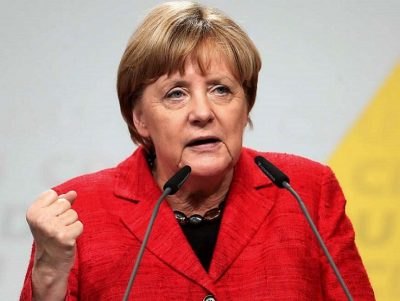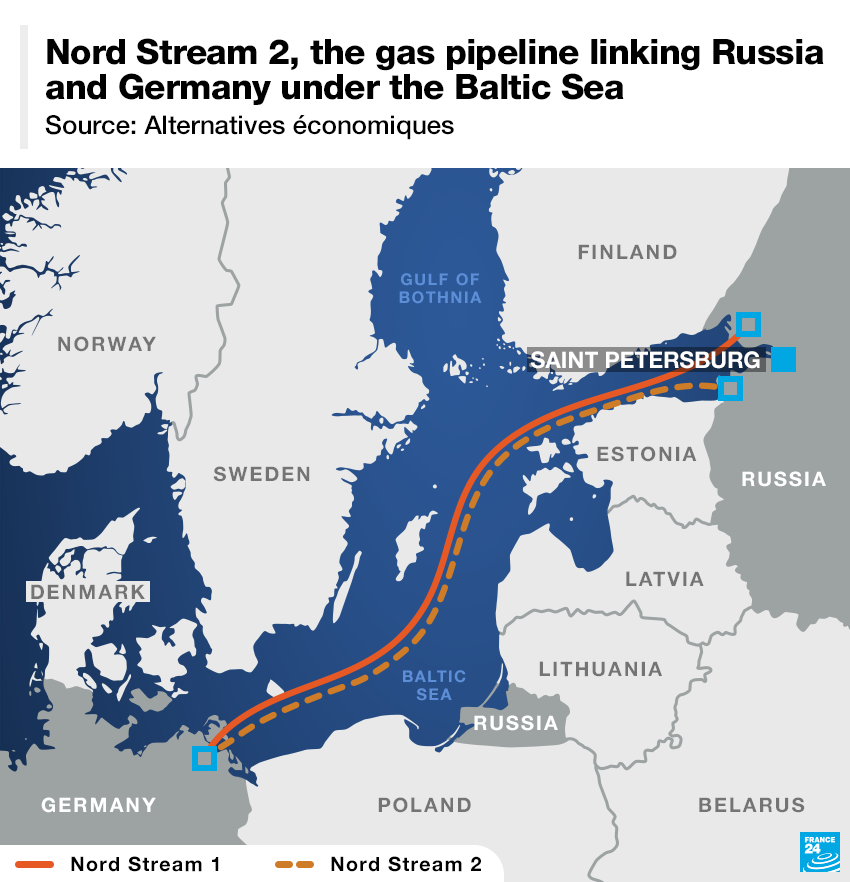Takeaways for Russia, India from Merkel’s US Visit

All Global Research articles can be read in 51 languages by activating the “Translate Website” drop down menu on the top banner of our home page (Desktop version).
Visit and follow us on Instagram at @crg_globalresearch.
***
A caveat must be added to the famous line by Lord Hastings Lionel Ismay, NATO’s first Secretary General and Winston Churchill’s chief military assistant during the Second World War, that the purpose of the Alliance was “to keep the Soviet Union out, the Americans in, and the Germans down”.
The alliance is no longer adequate to pin Germany “down” on the dissection table. The multipolarity in world politics creates space for a powerhouse like the reunified Germany to raise its head above the parapet of big-power politics. Germany has outgrown the NATO as a rising world power.
Quite obviously, Germany’s lack of enthusiasm for NATO’s eastward expansion blocked Washington’s agenda for Ukraine and Georgia’s induction into the alliance as full members. Berlin doesn’t want to complicate Europe’s relations with Russia. Ukraine and Georgia were not invited even as ‘observers’ to the recent summit in Brussels despite the 2008 Bucharest summit’s formal decision on their membership.
At the end of the day, Germany also moderated the Biden administration’s push to drag the alliance to the Asia-Pacific. Curiously, last Monday, within 3 weeks of the European summit with the US and the NATO and G7 summits, Chinese President Xi Jinping had a three-way video call with the French President Emmanuel Macron and German Chancellor Angela Merkel where he expressed the hope that China and Europe would expand cooperation to better respond to global challenge.
This has been the third such ‘summit’ in the past 3 months and reinforces Beijing’s belief that European countries have not tied themselves to the US chariot and although there are many similarities in terms of values and systems between the US and the EU, the latter is attaching more importance to strategic autonomy. read more
Indeed, the latest efforts by Merkel and French President Emmanuel Macron to organise another EU-Russia summit would have also caused irritation in Washington. read more
Therefore, the big question surrounding Merkel’s forthcoming visit to Washington on Thursday will be how far Washington wields power to make Germany sacrifice for the US hegemony anymore. The salience of the visit will be that it illuminates the diversity and flexibility of Germany’s thoughts on global issues.
Merkel’s July 15 visit to the White House marks only the third time a foreign leader will have met with Biden in Washington since he became president — and, she is the first European leader to do so. White House spokeswoman Jen Psaki said on Friday that Biden hopes to affirm “deep and enduring” ties between the NATO allies while also tackling some areas of disagreement.
A deal on Nord Stream 2?
Psaki called it an “official working visit” aimed at shoring up the partnership between the two countries and identifying ways to further strengthen cooperation, while an official in Berlin said, “From the German perspective, this will be a working visit.”
The laundry list is long — Biden’s decision to end the forever Afghan war, Covid-19, trade issues, Nord Stream 2. In practical terms, the Nord Stream 2, will be a heavily loaded issue, given its profound impact on German-Russian relations for decades to come, Europe’s energy security, Moscow’s current tensions with the European Union and the US’ trans-Atlantic leadership itself.
On Sunday, the managing director of Nord Stream 2 AG, which is running the pipeline project, and its German chief executive Matthias Warnig disclosed in an interview with the Handelsblatt newspaper that the construction is 98% completed by now and may be finished already in August.

According to Warnig, three months will be needed to receive various certificates and undergo trials. The process has already kicked off in respect of the pipeline’s first line that has already been completed. Our goal is “to commission [the project] already this year,” he noted.
Importantly, Warnig said he was convinced gas transit via Ukraine from Russia would be continued after 2024.
“Transit via Ukraine will still be part of Russian gas transportation to Europe even after 2024. I have not a slightest doubt,” he stressed. [Significantly, Merkel invited Ukraine president Volodymyr Zelensky to visit Berlin today in the run-up to her US trip.]
In May, the Biden administration took a nuanced step to waive sanctions on the Swiss-based Nord Stream 2 AG and its German CEO. The waiver gives Berlin and Washington three more months until mid-August to reach an agreement on Nord Stream 2. read more
President Putin exuded confidence in a TV interview last month when he said that
“it was already pointless to resist the construction of the pipeline and to impose sanctions. Because we have already completed it, the first branch is ready. It seems like [the US] has abandoned these sanctions.”
The question of what to do with the pipeline still could prove the first big headache for the next German government. Merkel pushed back at the heavy US pressure to abandon the project but she is retiring in September. Polls suggest that the elections to the Bundestag in September may yield big gains for the Green Party which opposes the Nord Stream 2 project. read more
Suffice to say, the Biden-Merkel meeting could provide important momentum for getting to a deal on Nord Stream 2. Berlin hopes to resolve the issue by August and on his part, Biden is also eager to improve ties with Germany, which is a key ally to deal with major global issues of climate change, post-pandemic economic recovery and relations with Iran and China.
TRIPS waiver a bridge too far?
From the Indian perspective, there is going to be keen interest on the outcome of the Biden-Merkel talks in regard of the contentious issue of a temporary waiver of intellectual property rights for the Covid-19 vaccines being considered by World Trade Organisation [WTO] members to help end the pandemic.
Last October, India and South Africa had floated the proposal to waive IP rights at the WTO’s Trade-Related Aspects of Intellectual Property Rights [TRIPS] Council.
The Biden administration has expressed backing for the waiver. But Germany poured cold water on the idea, maintaining that the greatest constraints on production of vaccines were not intellectual property but increasing capacity and ensuring quality. A German statement in May said, “The protection of intellectual property is a source of innovation and must remain so in the future.”
Evidently, European industry’s heavyweights — home to major players such as BioNTech and AstraZeneca — resist the waiver. In early June, the European Commission, under German influence, submitted an alternative plan to the WTO, proposing other measures such as limits on export restrictions, and the compulsory licensing of the patents in some circumstances. read more
However, the ground beneath the feet somewhat shifted on June 10 when the European Parliament backed the TRIPS waiver in relation to COVID-19 vaccines, treatments, and equipment. The European Parliament amendment was passed by 355 votes to 263, with 71 abstentions, largely following left-right lines, with leftists such as the Socialists and Democrats backing the waiver and those on the right opposing it. read more
Of course, the Commission is not bound by the European Parliament’s amendment but the vote sends a strong political message nonetheless: Europe is gradually shifting to the pro-waiver camp. Meanwhile, Germany is increasingly lonely in its opposition to the waiver, as France flipped lately and crossed over to the patent-suspension camp.
The tide seems to be turning, although there is still a long way to go, as the waiver camp also has multiple voices and appearances such as France’s can be deceptive.
Merkel may have got unexpected support from an influential quarter in Washington when World Bank President David Malpass [a Trump administration nominee, by the way] waded into the controversy, saying ”We don’t support that [TRIPS waiver] for the reason that it would run the risk of reducing the innovation and the R&D in that sector.”
To be sure, on Friday, when asked if Biden would seek to convince Merkel to support the patent waiver, Psaki was evasive. She would only say Biden is a “strong proponent” of the waiver, while Psaki went on to add, “It’s one tool in our toolbox. There are a number of others, including increasing manufacturing.” That sounded closer to Merkel’s thinking.
*
Note to readers: Please click the share buttons above or below. Follow us on Instagram, @crg_globalresearch. Forward this article to your email lists. Crosspost on your blog site, internet forums. etc.

